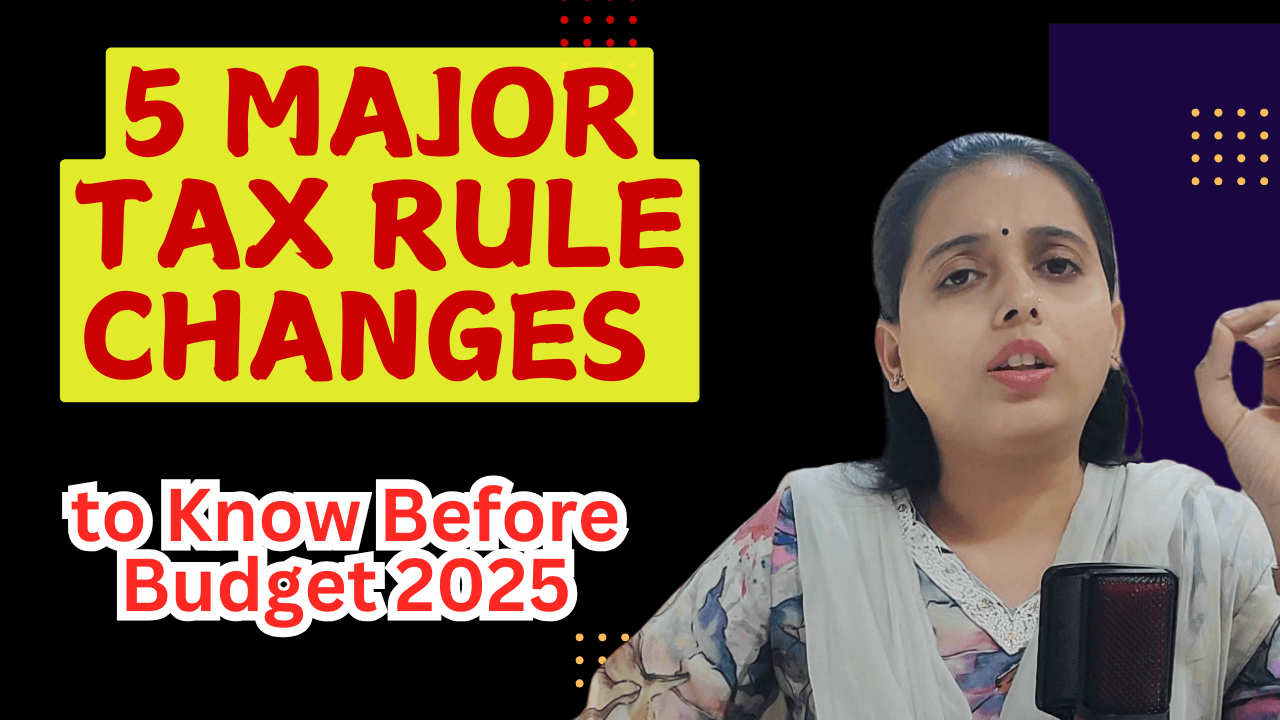5 Major Tax Rule Changes to Know Before Budget 2025
5 Major Tax Rule Changes to Know Before Budget 2025 The Union Budget of July 2024 brought significant updates under the new tax regime, introducing revised tax slabs and enhanced deductions to provide relief to taxpayers. With Budget 2025 on the horizon, taxpayers are eagerly anticipating further reforms, particularly in areas like income tax slabs, capital gains tax, and benefits for salaried individuals. Before diving into expectations for the upcoming budget, it’s crucial to understand the five major tax rule changes introduced over the past six months and their potential impact on personal finances.
Introduction of New Tax Slabs
One of the most noteworthy reforms from the last budget was the introduction of a new income tax structure aimed at easing the burden on middle-income earners. 5 Major Tax Rule Changes to Know Before Budget 2025 Here are the revised tax slabs under the new regime, effective from April 1, 2024:
- ₹0–3 lakh: 0% tax
- ₹3–6 lakh: 5% tax
- ₹6–9 lakh: 10% tax
- ₹9–12 lakh: 15% tax
- ₹12–15 lakh: 20% tax
- ₹15 lakh and above: 30% tax
This updated structure has allowed individuals earning up to ₹7 lakh annually to enjoy zero tax liability after applying rebates. Middle-income earners have also seen significant savings, with a reduction of up to ₹17,500 in their tax outgo. 5 Major Tax Rule Changes to Know Before Budget 2025 This change aims to encourage compliance and put more disposable income in the hands of taxpayers.
Increase in Standard Deduction
In a bid to provide further relief to salaried individuals and pensioners, the government increased the standard deduction limit:
- For salaried individuals, the deduction was raised from ₹50,000 to ₹75,000.
- For family pensioners, the limit was increased from ₹15,000 to ₹25,000.
This enhanced deduction reduces taxable income and provides financial relief to taxpayers, especially those with fixed incomes. 5 Major Tax Rule Changes to Know Before Budget 2025 For example, a salaried employee earning ₹10 lakh annually can now claim a deduction of ₹75,000, significantly reducing their tax burden.
Additional Exemption on NPS Contributions
To encourage more individuals to save for retirement, the deduction limit for the employer’s contribution to the National Pension System (NPS) has been increased:
- From 10% to 14% of the employee’s salary (including dearness allowance).
This change applies to both government and private-sector employees and aligns with the government’s vision of ensuring financial security during retirement. For instance, an employee with an annual salary of ₹12 lakh can now benefit from a higher employer contribution without additional tax liability.
Changes in Capital Gains Tax
Capital gains tax has undergone significant revisions, impacting both short-term and long-term investors. Here are the key changes:
- Short-Term Capital Gains (STCG) tax rate: Increased from 15% to 20%.
- Long-Term Capital Gains (LTCG) tax rate: Increased from 10% to 12.5%.
- LTCG exemption limit: Raised from ₹1 lakh to ₹1.25 lakh on equity investments.
These changes aim to boost government revenues while ensuring a balanced approach to taxation. While higher tax rates may impact investor returns, the increased LTCG exemption limit provides some relief, particularly for equity investors.
TCS on Luxury Items
A new Tax Collection at Source (TCS) rule has been implemented to enhance tax compliance on high-value transactions. Effective January 1, 2025, the rule applies to luxury items costing more than ₹10 lakh. This includes:
- High-end electronics
- Designer apparel
- Premium vehicles
- Luxury watches and jewelry
The collected tax can later be adjusted against the buyer’s total tax liability while filing their income tax return. This measure aims to curb tax evasion and increase transparency in high-value transactions.
Impact of These Changes on Taxpayers
These tax reforms have far-reaching implications for individual taxpayers and investors alike. While the revised tax slabs and enhanced deductions provide substantial relief to middle-income groups, the increased capital gains tax rates and TCS on luxury goods are designed to ensure higher tax collection from wealthier segments.
For instance:
- Middle-income earners benefit from reduced tax liabilities and higher deductions.
- Retirees gain from enhanced NPS contributions.
- Investors face higher capital gains taxes but can enjoy a higher exemption limit.
- Luxury buyers need to account for TCS in their purchase planning.
Looking Ahead: Expectations from Budget 2025
As taxpayers prepare for Budget 2025, there is growing anticipation for additional reforms. Key expectations include:
- Revised Income Tax Slabs: With inflation affecting disposable incomes, taxpayers are hoping for a further increase in the basic exemption limit and adjustments in slab rates.
- Capital Gains Tax Relief: Investors are expecting rationalization of capital gains tax, particularly for real estate and equity investments.
- Increased Benefits for Salaried Individuals: Higher exemptions for house rent allowance (HRA), transport allowance, and education loan interest are on the wish list.
- Boosting Savings and Investments: Introduction of new tax-saving instruments or enhanced limits under Section 80C could incentivize savings.
Final Thoughts
The last six months have seen transformative changes in tax laws, offering relief to some while tightening compliance for others. 5 Major Tax Rule Changes to Know Before Budget 2025 Staying informed about these updates is essential for effective financial planning and tax optimization. As Budget 2025 nears, taxpayers must align their strategies with the latest reforms to maximize savings and minimize liabilities.
Stay tuned for more updates and insights on Budget 2025 and practical tips to navigate the evolving tax landscape.
Sources – https://shorturl.at/JxBGq
For More Information : https://taxgyany.com/

